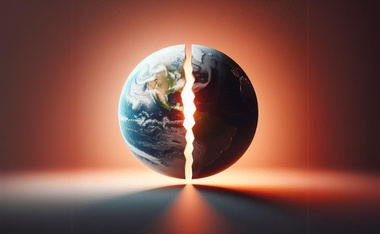The views expressed in our content reflect individual perspectives and do not represent the authoritative views of the Baha'i Faith.
The German-Jewish thinker and philosopher Hannah Arendt, who immigrated to the USA after the Nazi seizure of power, wrote in her 1957 New Yorker essay titled “Truth and Politics:”
No one has ever doubted that truth and politics are on rather bad terms with each other, and no one, as far as I know, has ever counted truthfulness among the political virtues. Lies have always been regarded as necessary and justifiable tools not only of the politician’s or the demagogue’s but also of the statesman’s trade.
This critical analysis from the time of the Vietnam War seems no less applicable to the wars of the 21st century.
RELATED: 3 Simple Ways to Build Unity in a Polarized World
Unfortunately, lies, bigotries, and prejudices start wars.
So, how do we deal with finding the truth when warring countries and factions have entirely different versions of what they consider to be true? Now, public discourse is additionally unsettled by disinformation and propaganda, making it even harder to seek and find truth.
From a Baha’i perspective, encountering different opinions always marks the beginning of a truth-finding process, whether in personal spheres, interreligious forums, or wherever. In fact, that principle — the independent investigation of the truth — is one of the bedrock beliefs of the Baha’i Faith. Abdu’l-Baha, in a speech he gave in Washington, D.C., in 1912, said:
The first teaching of Baha’u’llah is the duty incumbent upon all to investigate reality. What does it mean to investigate reality? It means that man must forget all hearsay and examine truth himself, for he does not know whether statements he hears are in accordance with reality or not. Wherever he finds truth or reality, he must hold to it, forsaking, discarding all else; for outside of reality there is naught but superstition and imagination.
In practical terms, this means that only the often painstaking path of consultation — which we can alternatively call discussion or dialogue — leads step by step to truth-finding. Abdu’l-Baha also said, “The shining spark of truth cometh forth only after the clash of differing opinions.”
So, it has become crucial that, in an attitude of mutual respect, all presented alternatives or opinions are allowed, and all participants in any discourse feel free to express their opinions. Only the ability to find truth, despite a wide diversity of opinions, can help us in times of crisis to avoid polarization and division. We must listen to everyone.
This raises the question: how does the lack of political truthfulness lamented by Arendt contribute to uncertainty, distrust, and polarization? A loss of consensus on important societal issues — in other words, a loss of the ability to make decisions that can be equally supported by the majority of the population — can endanger democracies dependent on truth for their survival.
Peace — The Primary Concern of Humanity
The past wars of the 20th and 21st centuries speak to us now in clear terms: Nobody “won.” There were only losers.
With globalization and the emerging division of the world into ever more alienated geopolitical blocs, this trend could worsen. More armament brings no solution. Before these two centuries filled with hopeless wars, Baha’u’llah, the founder of the Baha’i Faith, wrote about a necessary, worldwide peace:
Such a peace demandeth that the Great Powers should resolve, for the sake of the tranquility of the peoples of the earth, to be fully reconciled among themselves. Should any king take up arms against another, all should unitedly arise and prevent him. If this be done, the nations of the world will no longer require any armaments, except for the purpose of preserving the security of their realms and of maintaining internal order within their territories.
Ensuring peace as a joint task of all nations of the world is, therefore, the unavoidable task necessary for the future well-being of humanity.
With the establishment of the League of Nations in the 1920s and the United Nations in the 1940s, the initial steps in this global path toward the collective security of all humanity have already been taken. Those baby steps, imperfect as they were, nevertheless started our human family toward the goal of unity and peace.
RELATED: How to Achieve Human Harmony and Unity
These first steps implicitly recognized, as the Baha’i teachings have pronounced since the middle of the 19th century, that we must now regard the entire human race as one family, extending beyond all borders, whether national, religious, or ethnic. In a prayer he revealed at the All Souls Church in Chicago in 1912, Abdu’l-Baha asked the Creator to:
Unite all. Let the religions agree and make the nations one, so that they may see each other as one family and the whole earth as one home. May they all live together in perfect harmony.
Although humanity still seems far from achieving social justice, perfect harmony feels like an impossible goal, and the dismantling of borders remains a challenging issue everywhere, our compassion for all people suffering from wars and distress must be comprehensive. Above all, one-sided compassion must not lead to hatred; hatred can easily be used to justify more wars.
Before the First World War, in 1911, during a speech in Paris, Abdu’l-Baha called on his listeners to “show compassion and goodwill to all mankind.” We can best accomplish that lofty goal by doing everything in our power to prevent future wars.
How? Well, it’s clear that the growing polarization in our societies and the world at large is, to a significant extent, an inheritance of the past. The Baha’i teachings urge us to align our inner compass with the future, focusing our thoughts, our discourse, and our actions on the well-being of the entire human race. We can work toward a peaceful future if we center our thoughts and actions in the service of others — in our personal environment, in our region of the world, and preferably on a global scale.
An earlier version of this article first appeared in German here: https://www.perspektivenwechsel-blog.de/bahai-artikel/diskurs-mitreden
















Comments
Sign in or create an account
Continue with Googleor